Translations 677
Thanks to Cuba, I Came Back to Life


First Cuban Coronavirus Carrier:
“Thanks to Cuba, I Came Back to Life”
Jesús Álvarez, who has been discharged, said he had the strength to resist in the middle of the storm, because he knew about the quality of Cuban medicine
Author: Freddy Pérez Cabrera | internet@granma.cu
Translated and edited by Walter Lippmann for CubaNews.
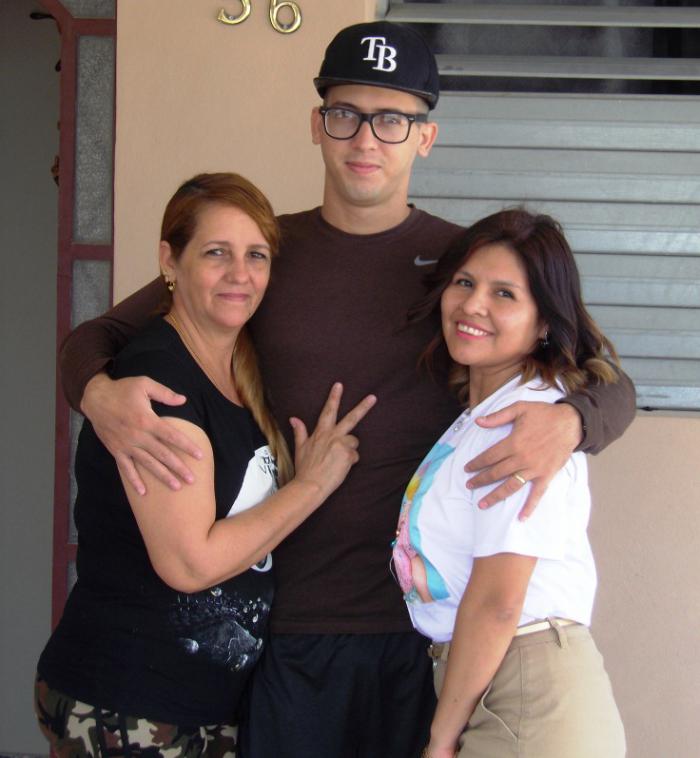
Jesús Álvarez López, the first Cuban carrier of the COVID-19, with his mother Irania López Aldama and his wife, the Bolivian living in Italy, Anel González Zurita. Photo: Freddy Pérez Cabrera
Santa Clara – I do not have words to express my gratitude to Cuba, which has been able to train such humane and professional doctors, nurses and specialists, thanks to whom I am back to life today, said Jesus Alvarez Lopez, the first Cuban carrier of the new coronavirus who has been discharged.
The 25-year-old dancer, who lives in this city, told Granma that at present he is evolving very favorably, and with a very rigorous follow-up by the family doctor, who comes daily to see how he is doing, takes his temperature and performs other controls, according to the protocols established for these cases.
About the experience, he said that his wife, Anel González Zurita, a Bolivian citizen living in Milan, Lombardy region, Italy, had arrived in Cuba without any apparent symptoms of any illness. However, a few days later she began to have slight respiratory problems, as he did. For that reason they went to the health system, where they were immediately admitted to the Villa Clara isolation hospital, and later transferred to the Pedro Kourí Institute of Tropical Medicine (IPK), where the illness was confirmed.
“Imagine what I suffered at that moment; the world fell on me. I felt fear, I thought the worst, in my family, in my little girl Ana Sofía who was only one year old. But I had the strength to resist in the middle of the storm, because I knew about the quality of Cuban medicine,” says Alvarez Lopez.
Referring to the treatment he received, he has words of praise for the doctors and all the staff who work at the Manuel Piti Fajardo Hospital in Villa Clara and the IPK, for which he says he feels grateful. They made him understand that he was not alone during those days of isolation. “They were my parents, my brothers, my friends,” the young man said emotionally.
“There I lacked for nothing, no medicine, no resources of any kind. They even spoiled me a little bit, because if I was hungry, it didn’t matter if it was two in the morning, they brought yogurt or some food. If I wanted to talk to my family, they facilitated the conversation through the telephone. In short, I was pleased with everything, says Jesus, who before saying goodbye, wanted to send a message to the Cuban people, whom he thanked for so much love in these difficult days.
“I am worried because I see some people who are still on the streets and without the necessary consciousness for the present situation. To them I say to take care, that this can touch anyone. You have to listen to the guidelines of the government, which is working very hard to avoid the worst. If we take all the measures, we will get out of this, because we are a people of battle, nobody doubts that, we will win.
How Cecilia Valdés Calms Italy

How Cecilia Valdés Calms Italy
Cuban lyric singer Diana Rosa Cárdenas Alfonso, who lives in a region of Lombardy, relieved her neighbors who live in quarantine because of the COVID-19
By Lisandra Gómez Guerra
March 18, 2020
Translated and edited by Walter Lippmann for CubaNews.
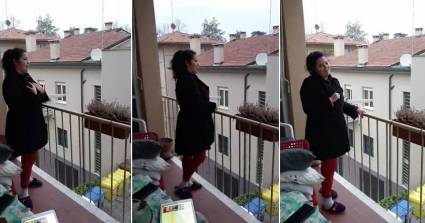
Cuban lyric singer Diana Rosa Cardenas Alfonso, resident in a region of Lombardy, relieved with art her neighbors who live in quarantine by COVID-19 Author: Facebook Posted: 18/03/2020 | 09:47 pm
Mantua Lombardy, Italy; 6:00 p.m., March 13, 2020. Only silence breaks the area bordered by buildings. Only a few people walk at a brisk pace around a supermarket. A few others shyly take in the last rays of sunshine from their balconies. They have been confined within four walls for too many hours and there are still many others to come. No one speaks. The afternoon seems the same, for more than a week now.
Suddenly, a sound light forces them to look outside. A miracle! Maybe they thought. But, the close neighbors came out grateful to enjoy a real show. From a small balcony, Cuba embraces the pain and sadness of hundreds of Italians who live day by day a duel with the coronavirus. Thank you, Cecilia Valdés, for so much spirituality. Thank you, Diana Rosa Cárdenas Alfonso, Cuban lyric singer living in Mantua, region of Lombardy, one of the Italian areas most affected by the coronavirus, for alleviating despair.
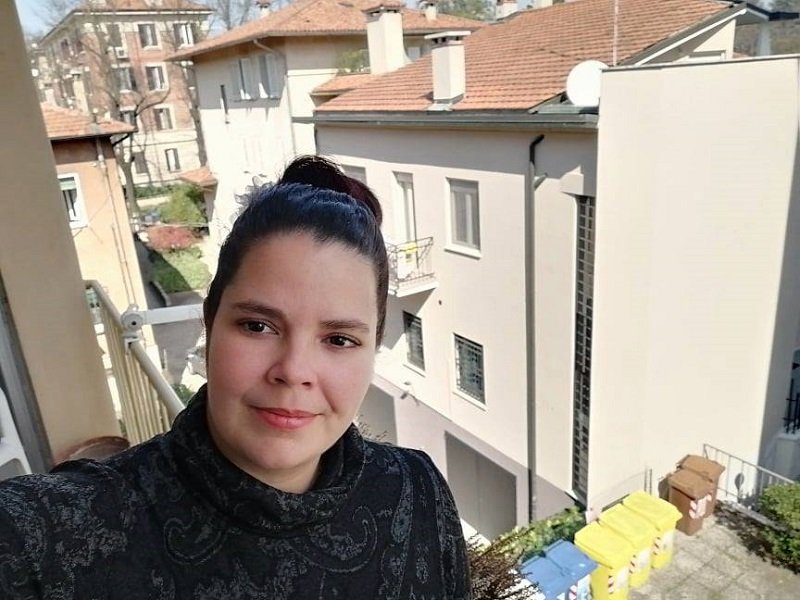 “If we chose to be artists it’s because we decided to make people aware. Art always helps. In a moment as complex as this one, it reaches a greater transcendence because it touches inside. That’s why we can feel alive, even if everything around you is dying. We will always remember that moment because it has united us as human beings,” Diana Rosa tells Juventud Rebelde via messenger, an application that erases the thousands of miles between her and this island.
“If we chose to be artists it’s because we decided to make people aware. Art always helps. In a moment as complex as this one, it reaches a greater transcendence because it touches inside. That’s why we can feel alive, even if everything around you is dying. We will always remember that moment because it has united us as human beings,” Diana Rosa tells Juventud Rebelde via messenger, an application that erases the thousands of miles between her and this island.
That Friday afternoon, she did not hesitate to accept the flashmob (a call to a large group of people to do something unusual) from every balcony, through social networks, an initiative that spread as quickly as the coronavirus itself. She went out to the small space of her apartment. Dressed in a black coat, red pyjamas, socks and flip-flops to get around the little cold air that has yet to leave Mantua, she rose up on the improvised stage.
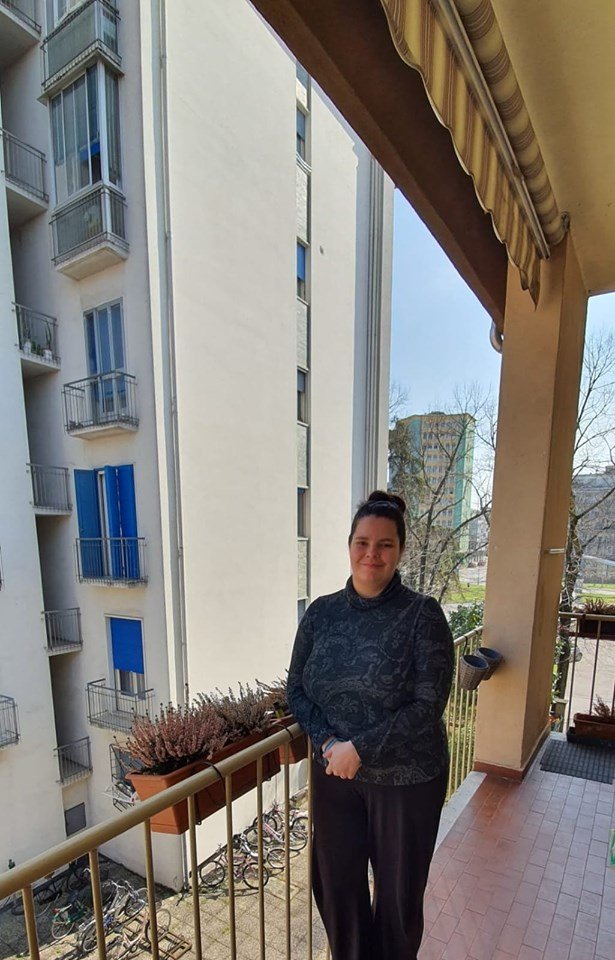
She turned on the horns and raised her voice. On one side, her husband immortalized the moment, in a video that went viral in a few hours on several social networks. On the other, Marilu, her cat, watched it with pleasure. All around, little by little, spectators and many ovations joined in.
“They were super happy. They applauded me a lot. They shouted at me that if I needed an audience after everything was over, I should call them. The salespeople at the supermarket, where they have not banned sales because of the need for the service, shouted “You are brave,” says the 30-year-old young woman from Havana, her voice broken by so much emotion.
And although Diana Rosa, since her arrival in Italy in 2013 – one of her dreams for having opera as a genre with deep roots there – to perfect what she learned in the teaching unit of the National Lyric Theater of the Amadeo Roldan Conservatory, has made several of its stages her own, she still finds the experience difficult to digest.
“We went out to check if anyone else was doing anything and nothing happened. So, we said, let’s do it. It was very improvised, it was even half-disheveled. And it’s not the custom here to do that. I even live in a region where people are not as expressive as those who live in southern Italy. That’s why I never imagined singing on the balcony. Of course, at home I do, so my closest neighbors know I’m a lyrical singer,” says the woman who alternates presentations, after passing the auditions, with classes in lyrical and modern singing.
But the departure of Gonzalo Roig’s zarzuela was not the only thing that calmed Mantua’s life: “I also performed some operas from this country, such as Turandot. And two days later, I did a duet with my Japanese neighbor, each from her home, and we sang Mozart’s The Marriage of Figaro. That time, even my kitten joined in with her meows,” she adds, while a smile cuts off communication.
-Why Cecilia Valdés?
-Since I was a child I’ve had a strong bond with that work. My mother used to sing it to me, although she didn’t study lyrics. I played it in Cuba and here I did my thesis at the Lucio Campaniani Music Conservatory on the three Cuban zarzuelas: Cecilia Valdés, María la O and Amalia Batista.
“I am very grateful for my training in our country, especially to my teacher Adolfo Casas, for having instilled in me love and respect for that repertoire. Cecilia Valdés wastes Cuba, not only for her text, but for mixing so many rhythms. If I am Cuban, how can I not give away our art in such a complex moment?
-How much of Cecilia, as a true Creole, is there in Diana?
-I think a lot, because in reality when she says she doesn’t know what it is to suffer, that’s what characterizes us Cubans. We always put on a happy face in moments of sadness and problems. We face everything with a lot of dignity. Cecilia is Cuba.
-Why do you think that interpretation has gone around the world?
-First, I never imagined that it would happen. But it must have something to do with the fact that I gave away a song that belongs to me for being Cuban. I am happy to have awakened so many feelings, solidarity, brotherhood…, although it was in such a sad situation as the one we lived in and we will not forget.
“I have received hundreds of compliments and messages of love. Even a friend told me he saw me on Brazilian television. That response teaches us that we are capable of feeling and loving even in difficult times. But many are the artists who have done the same, and thanks to the networks we can enjoy them”.
For more than a week, Diana Rosa has barely passed the perimeters of her apartment due to a measure adopted by the Italian government to prevent the spread of the pandemic. “When I go out, just for a medical emergency or to buy food or medicine, I wear a mask, gloves, glasses. When I come back I take everything off, wash it and put my coat and shoes on to get some air and sun.
“I wash my hands constantly and inform myself. I maintain links with the Facebook page of the Cuban Embassy in Italy and my mom calls me every day. They are worried about us over there, but we are fine,” says the woman who inherited her passion for music from her baritone grandfather and his father, who, without any academic training, mastered the chords of the guitar.
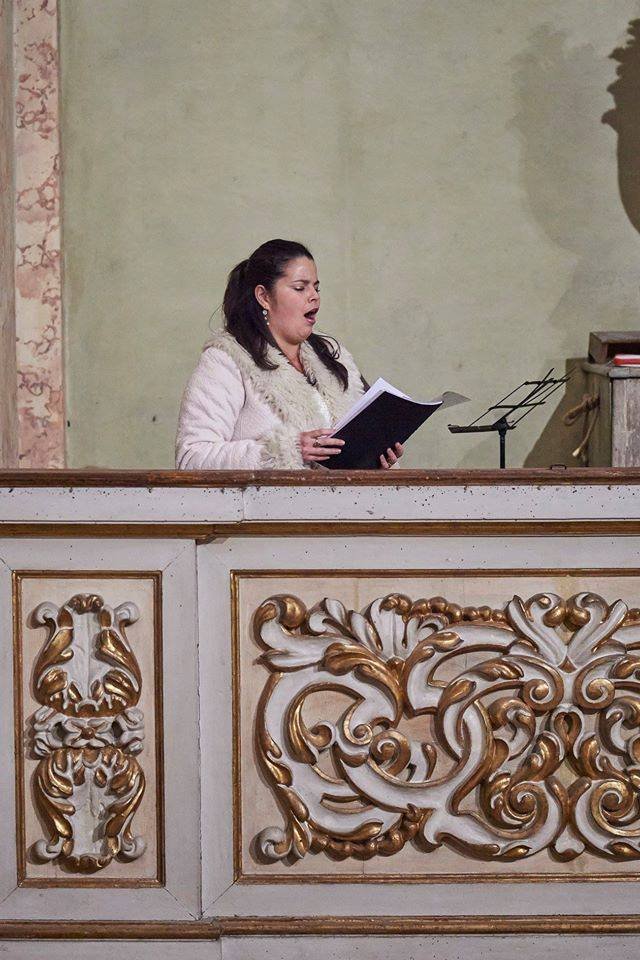
-In your opinion, why has the coronavirus been so strong in Italy?
-I suppose it’s because at the beginning they didn’t take the measures of restriction that should have been demanded. It’s a virus that spreads quickly and you can have it and be asymptomatic. That’s why any measure is insufficient,” she insists whenever someone asks about the health of the Old Continent.
And while Italy, like many parts of the world, continues to be trapped by the tentacles of a virus that is bent on stealing thousands of lives, Diana Rosa thinks about how to dispel the annoying silence that surrounds her.
“Some artist friends have asked me why I did it, as if when everything happens no one will remember. I don’t care if that happens. Sometimes a single moment is enough to realize so many good things. I experienced that that afternoon and I will continue to live it from my balcony, at least until we are free of this situation,” she concluded.
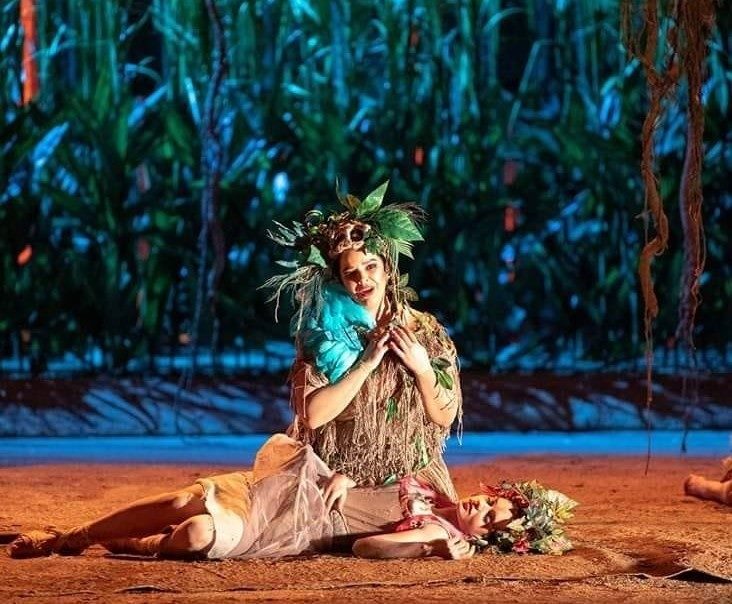
You can also listen to the interview on our podcast
Against the Coronavirus, Count on Cuba
Against the Coronavirus, Count on Cuba
By Jorge Gómez Barata
March 18, 2020
Translated and edited by Walter Lippmann for CubaNews
I heard two appeals to the Cuban government yesterday. A brief and peremptory: “Close the airports: Now!” The other one sounds like a plea: “I ask the Cuban government please DO NOT to send our medical personnel anywhere…”
By the way, the Chinese authorities believe they have identified “patient zero.” He is a man who contracted the virus in mid-November 2019. Since then, more than 100 days, after which there are three sick people in Cuba, no dead, and about 150 contacts under medical supervision. why then close the airports?
The other fellow Cuban, asks that “no medical and nursing be sent anywhere…” The thing is, the government doesn’t send them. In any case, it summons trained professionals and in full use of their rights acting voluntarily. Probably, many take on the task not as a task, but as an opportunity. I know comrades, myself among them, who believe it was worthwhile to go Angola where the risks were enormous.
In December 2019, China was surprised by the aggressiveness of COVID-19, but not Europe and the United States. In fact, since the end of December 2019 and early March 2020, had more than 60 days to prepare. The warning was early, although the reaction turned out to be late. The alarm, at times a mixture of impotence and hysteria, is motivated not only by the explosive spread of COVID-19, but also by the ineffectiveness of health systems in responding to situations to guide social and economic activity. societies to observe minimum rules.
Cuba, with more than 100,000 doctors and sufficient nursing staff, more than 3000 hospital beds for that purpose, the means to diagnose and the necessary medicines and a national mobilization led by the president of the republic, manages the threat. It does this without demanding extraordinary sacrifices and costs from the population which they cannot incur.
Cuban solvency stems from having faced two major epidemics: African Swine Fever in 1980 and a sudden outbreak of Dengue Fever that 1981 affected more than 300,000 people, 158 of whom died. To study, participate in events or get cured, they come to the island by the thousands, people from poor countries and tropical climates where there are infectious diseases. Cubans, too, by the hundreds of thousands as happened in Angola, travel and stay in those countries. Rejecting some and preventing others from traveling is not part of Cuba’s national health doctrine.
Cuban solvency can be explained by the fact that for decades, thanks to the existence of an effective health model, based on a system of primary care, an advanced approach to the epidemiological issue [has been in place] It addresses the prevention and treatment of diseases like Dengue, Zika, Cholera, Chikunguya and others. Cuba’s strengths show that it is not always about money. From one day to the next some developed countries can have fifty billion dollars to deal with the pandemic. However, no amount of money will allow you to install national primary care and to have hospital capacities to deal with the COVID-19 crisis. Nor is it possible to inculcate all people, the habit of going to the doctor as the Cubans do, among other reasons, because none of them will leave in debt or broke.
The task of the moment, as the World Health Organization suggests, is to identify, isolate and cure the infected, and control rigorously their contacts. As for the tourists, people presumably healthy, checked in their countries and re-examined when you get to the island, there’s nothing to be afraid of. As it has always been done, those who arrive healthily will be cared for and those who unfortunately get sick, they’ll be cured. See you there.
The Digital Pandemic

The Digital Pandemic
False news and computer attacks that promote collective hysteria swarm around the world these days, regarding the new coronavirus
By Yurisander Guevara
Translated and edited by Walter Lippmann for CubaNews.
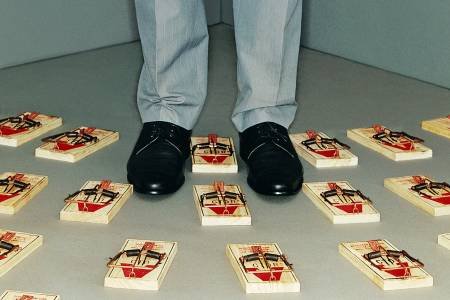 The impact of a pandemic is felt in all walks of life. The technological world, of course, does not escape it. That COVID-19 has spread to all regions of the world is already wreaking havoc on industry, as evidenced by the dozens of canceled events and extreme measures that have made headlines in recent days.
The impact of a pandemic is felt in all walks of life. The technological world, of course, does not escape it. That COVID-19 has spread to all regions of the world is already wreaking havoc on industry, as evidenced by the dozens of canceled events and extreme measures that have made headlines in recent days.
False news and email hoaxes are also rampant, seeking out victims in people who are uninformed or eager to learn more about the virus, so they are capable of clicking anything.
In this issue we summarize some of the false news found in the networks, related to myths that have been denied by the health authorities.
It’s not true that…
*It’s false that the virus is in the air It is transmitted through droplets of saliva or mucus, mainly when coughing or sneezing, hence the importance of masks or naso-buckets for those who identify themselves as sick, mainly.
*It is highly recommended to wash your hands well. Recent information states that it is more decontaminating to use soap and water than hydroalcoholic gel. False news indicated that water alone would keep the virus away.
*The virus is not mutating: the World Health Organization assures us that the virus maintains a stable structure. Variations in symptoms among affected people are associated with previous pathologies and the interaction of the coronavirus with these.
*Dogs and cats do not transmit the virus, nor do mosquitoes. Basic hygiene care must be followed with animals, but the coronavirus has not been shown to affect pets more than people. There is a whole family of known and harmless viruses, very common in cats and dogs for many years, which are called coronaviruses because of their crown shape, but they are not COVID-19. As for mosquitoes – agents that transmit diseases such as dengue, zika or chikungunya – it has not been proven that they transmit this virus either.
*The coronavirus cannot be cured and we are no longer protected by the pneumonia vaccine, Ebola treatments or antiretrovirals for HIV. This is a different virus for which a concrete solution is being sought, according to the WHO. On the way, it is normal that experimental treatments are made, but it is not advisable to self-medicate. The treatment of the coronavirus is currently symptomatic and is in the hands of epidemiologists.
*There is not a pattern of behavior before different ages. It is false that the elderly are the first to be infected or that children are immune. The deaths of older people and those who are immunosuppressed with other opportunistic diseases are not a definitive indicator of the seriousness of the coronavirus.
*Smoke from fireworks and firecrackers does not kill the pathogen. Incredible as it may seem, it has been circulated on the web that smoke generated by gunpowder kills the coronavirus. The WHO radically denied this possibility and warned that fireworks can cause burns and irritation to the eyes, throat and lungs.
*Many of the recommendations about what to eat, how to avoid spicy food or take too much vitamin C are false. The only thing the WHO recommends is not to eat raw or undercooked animal products.
*Sesame oil does not kill the virus, although bleach or chlorine-based disinfectants do. It should be understood, however, that these substances hardly affect the virus if applied to the skin or under the nose, WHO stressed, as a warning to those who might think of extreme prevention.
*The virus is not related to room temperature. It has been claimed that the coronavirus is vulnerable to heat, but that does not mean that high temperatures will exterminate it. Cases have been reported in all types of weather, hot or cold, dry or wet.
*The virus has nothing to do with its country of origin. Many memes have been shared discriminating against the Chinese, as if they were to blame for the existence of the virus. That an evil has been generated in this country that is now a pandemic does not give the right to discriminate against them. Solidarity must be a principle.
Digital Care
On the other hand, it is important to be alert to the contents received in the email. According to Wired, phishing scammers -a procedure to infest a computer and then access its data and use it for the benefit of the hacker- have taken advantage of fears about the spread of COVID-19 to create e-mails with that in the subject.
This week the Chinese firm QiAnXin detected Russian hackers, possibly affiliated with the groups Sandworm and Fancy Bear, who sent emails with malicious document attachments to Ukrainian targets. The emails claimed to come from the Ukrainian Health Ministry’s Public Health Center and arrived in the midst of a disinformation campaign that stoked fears about the spread of the virus in the European country and caused riots.
Meanwhile, the Vietnamese security firm VinCSS detected a large volume of new phishing emails related to the coronavirus in the last two weeks, attributed to hackers. The emails include a malicious attachment purporting to contain information about COVID-19, allegedly sent by the Vietnamese Prime Minister. Of course, it’s a fake.
Another campaign attributed to Chinese actors by Check Point investigators targeted victims in Mongolia. South Korea suffered phishing attacks in February, with emails addressed to government officials, in which documents contaminated with malware were sent.
As always, it is best to be on the lookout for scams in times of uncertainty. It is not only the emails that need to be protected. Strings of messages are very common on social networks, but we recommend paying special attention to attachments that may arrive via WhatsApp, Telegram or another network.
Google and Twitter announced that searches related to the word coronavirus will try to match them with reliable content, and something similar will be done by Facebook and Instagram.
The truth is that institutionality is now relevant, and it is the official information that is the most reliable. In times of pandemic, sites such as www.sld.cu contain a huge amount of information to not only keep up to date, but to know how to act in the face of this challenge.
The Voice of Wisdom in Public Gatherings

The Voice of Wisdom in Public Gatherings
The usefulness and relevance of public meetings informing the population about details of the COVID-19 in Cuba are evident
By Haydee León Moya
March 20, 2020
Translated and edited by Walter Lippmann for CubaNews.
Guantánamo: Where they take their delegate to account, that is where it took place: in the community park. People arrived well before the scheduled time to attend a public health hearing on the coronavirus.
They were heard talking about the subject and what they were interested in being informed about. A young doctor from outside the neighborhood also arrived early and wrote down what he heard.
I never saw such quietness in the girl who was accompanying the adults. “This is very serious and you can’t interrupt,” a grandmother told her grandson, shortly before the young and very active leader of the neighborhood introduced the visitor in the white coat for a masterful lecture.
As a specialist in General Integral Medicine at the community polyclinic, he updated us on the positive cases of Covid-19 confirmed in Cuba until that evening. He explained the history of the disease, the ways in which it is transmitted, the symptoms that, if they appear, should make us go immediately to a medical institution.
He also gave the telephone number of the Command Post where one can ask for any guidance and made it clear that nobody can trust that their cough or fever is from a cold of days ago: You have to go to the doctor and demand that behavior in every house, as well as smearing hypochlorite on the common surfaces, which in the neighborhood pharmacy are regulating its sale so that everyone has enough.
“The doctor’s office is the closest, so you don’t waste any time, but you can go to the one you want,” the doctor replied.
“Listen, I know of a person who came from outside and spent the night coughing. What can you do if you don’t want to go to the hospital?” asked another neighbour.
“Well, you must isolate him and demand that he go to the doctor, or you can call the telephone I gave you and report it,” explained the specialist very seriously.
“But look, doctor: look at all the positive cases in Cuba, if not foreigners, at least they have had contact with those people or visited countries where the disease is spreading. If you see one of those cases, to prevent them from walking in the street it’s better to call the command post and have them pick you up in an ambulance, don’t you think?”, said another.
“That’s very good and it’s already planned. People who have an illness related to the characteristics of this disease should participate actively and responsibly in the protection of the rest of the population,” insisted the doctor, and answered other questions from the same court.
That is precisely the value of these public exchanges in the open air: People inform themselves, participate, anticipate and learn, thinking about their own and others with a more responsible tone.
Cuban CP on Kissing and Covid-19

Prudence
This is a struggle in which we are all involved, of a social nature, and in which each one must impose on him/herself the condition of being responsible, for his own good and that of others.
By Ventura de Jesús
March 21, 2020
Translated and edited by Walter Lippmann for CubaNews.

Photo: Taken from the Internet
Covid-19 continues to spread around the world, with increasing levels of infection and death. The signal is very clear: protocols for prevention and control must be followed, and very strict health rules must be observed in order to avoid at all costs contagion and the spread of the disease.
There are various measures and lessons to flatten the epidemic’s curve and the emphasis is on collective awareness, discipline, and individual responsibility.
In addition to strengthening hygiene care, experts warn that personal behavior is key. They recommend social distancing measures, such as voluntary quarantine and isolation, as well as avoiding displacement and crowding.
Others are aimed at not shaking hands and avoiding kisses, and trying to keep at least one meter away from other people, something whose benefit nobody doubts, but which to a certain extent is tormenting for Cubans, since they quarrel with habits that are deeply rooted in our society.
Visual and physical contact in Cuba does not have the same connotation as in other parts of the world. According to scholars, it is part of nature and responds to socio-cultural and historical phenomena.
Fortunately, there are those who have given up on the fraternal embraces, friendly romps and other approaches that usually characterize the encounters between acquaintances, friends and family on the island.
There are more and more people who greet you from a distance or give you an affective glance from afar. There are even those, the few, who pass by without looking. They believe that this does not hurt anyone’s feelings, and is healthy for the purpose of evading the Covid-19.
The truth is that putting aside, or postponing for the time being, the relationship of joyful camaraderie in the form of handshakes or necking, need not sour anyone’s character or be a source of laughter or mockery. Everyone should understand the reasons and not overlook the importance of caution, even against their will.
Despite many exhortations, many people still do not take this particular matter seriously, and there is no human power capable of persuading them that, for example, affectionate greetings should be avoided.
Perhaps that is why we Latinos, and particularly Cubans, are like that. There are those who think that a kiss does not hurt anyone and find it extravagant to greet each other with an elbow or with simple gestures from a distance. They consider it a useless torture and continue to obey that ancient custom of shaking hands or hugging a friend.
Although some do not seem to be aware of it, this pandemic is dangerous and causes countless setbacks, including some that are related to our daily habits.
Cubans, bound by affection and solidarity, must continue to work with serenity, security and discipline to successfully confront the new coronavirus, as President Miguel Díaz-Canel indicated.
On an individual level, this means not losing track of reality and looking at the faces of others with our hands on our hearts. In this way, we accompany the country’s decisions and do not fail in the will that guides us in this battle.
It is a struggle in which we are all involved, of a social nature, and in which each one must impose on themselves the condition of being responsible, for your own good and for that of others. For the time being, we must postpone some customary habits. It is convenient for everyone, for you and for me. It is the most prudent thing to do.
Bolivia Suspends Elections until Further Notice


Bolivia Suspends Presidential
Elections until Further Notice
The Bolivian de facto government declared total quarantine this Saturday, taking effect from Sunday and will last 14 days, as an extreme measure to combat the new coronavirus pandemic.
March 22, 2020
Translated and edited by Walter Lippmann for CubaNews.
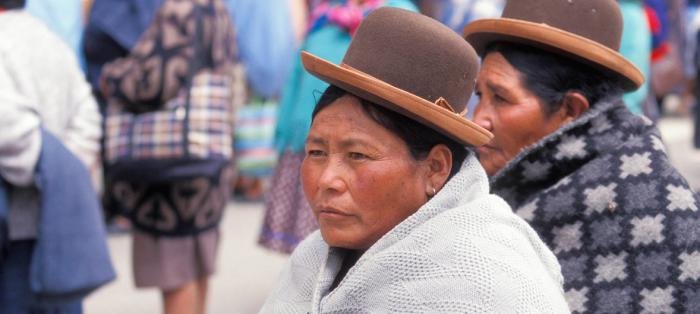
Photo: Taken from the Internet
The Bolivian Supreme Electoral Tribunal (TSE) announced on Saturday the suspension of the election calendar due to the total quarantine decreed by the de facto government in the face of the new coronavirus, and therefore the presidential elections scheduled for May 3.
The President of the Supreme Electoral Court, Salvador Romero, said that the new date for the elections should be set “with technical support”. He reiterated that it should be made taking into account scientific assessments on the evolution of the pandemic. “It must be accepted without bias in favor or against any political organization or candidate,” he added.
In its statement, the TSE also expresses its commitment to resume its activities as soon as the minimum conditions are met.
“We declare our willingness to continue the broad and pluralistic dialogue with all political organizations participating in the 2020 process, as well as with the other branches of government, so that in a framework of consultation and unity of all Bolivians, we can define a new date for the voting day of the 2020 general election,” the TSE’s statement states.
For the time being, health authorities reported that 19 cases of infection and no deaths have been confirmed in the country.
In the run-up to the elections, the Movement Towards Socialism (MAS) is the favorite to win the presidency, vice-presidency and most of the seats in the Plurinational Assembly.
Quarantined Physician Describes It

Quarantined
Holguinera doctor Yaritza Pérez Peña fought her first face-to-face battle with the Covid-19
By Germán Veloz Placencia
March 19, 2020
Translated and edited by Walter Lippmann for CubaNews.
I’m listening to Dr. Yaritza Perez Pena on the phone. Her voice sounds strange because she’s wearing a nasobuco [face mask]. I confess that I am anxiously looking for this contact and that she has more admirers behind her. I wish, I tell her, that from the Military Hospital of Holguin, where she is now in quarantine, she will share details of the moments in which, thinking of human beings, with her clear vision as a doctor, she fought her first face-to-face combat with the Covid-19.
“It was at the Hotel Rio de Oro, in the municipality of Rafael Freyre. She worked at the International Clinic of Guardalavaca and was on duty at the hotel’s Medical Post, where a Canadian guest arrived, at the suggestion of Mariluz Claro, the room’s waitress. She detected that the tourist had a cough, vomiting and diarrhea.
“Mariluz didn’t waste any time. She was alert and also warned her superiors about the case. This is what all the hotel staff was told to do when they trained staff to act at times like this. Together with nurse Marilín Oramas, I concluded that we were facing a suspicious case of the new coronavirus and we isolated it right there, to cut the chain of contacts with other people”.
She tells details about the operation of isolating the patient and his subsequent transfer to Villa El Cocal, in order to carry out the test expeditiously, which, sent to the Laboratory of Molecular Biology of the Provincial Center of Hygiene, Epidemiology, and Microbiology in Santiago de Cuba, proved positive.
Yaritza Pérez, since she was a student at the University of Medical Sciences of Holguín, has prepared herself to face contingencies like this, she assures us. Then in Brazil, during her second mission as a collaborator, she faced severe outbreaks of zika, dengue and malaria, and implemented well-designed medical protocols. But the new coronavirus has great contagious power and collective vigilance to detect cases and prevent their spread cannot be compromised, she says.
She says that in the 26 de Julio neighborhood in Rafael Freyre, her son, husband, parents and siblings are keeping an eye on their progress during the period of isolation, and that is great emotional support. She is also called by her colleagues at the clinic.
“Mariluz, Marilín and I remain asymptomatic, just like the rest of the people we contact with the patient. We will be isolated for about 14 days, which is the incubation time of Covid-19. We feel protected by the staff of the Military Hospital. They have been very gentle with everyone.
In hands like those of these names, the Cuban family is well protected. The best thing is that, throughout the island, there are thousands like them.
CFK and Florencia Fly to Argentina

Cristina Fernández de Kirchner and Her Daughter Florencia Fly from Cuba to Argentina
In her text, Cristina Fernández de Kirchner also recommends that Argentines respect preventive isolation within the framework of the fight against the coronavirus pandemic
By Redacción Digital
March 20, 2020
Translated and edited by Walter Lippmann for CubaNews.
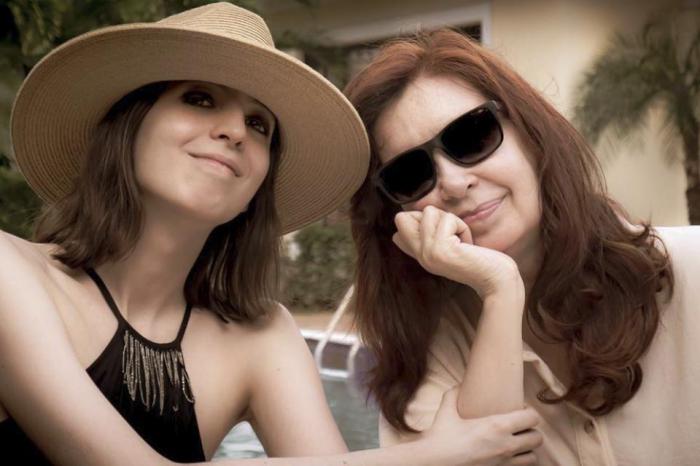
Photo: Taken from the Internet
Vice President Cristina Fernández de Kirchner announced that she is returning to Argentina from Havana, Cuba, with her daughter Florencia Kirchner. The decision was made public by the former president herself through her Twitter account. There, in a tweet, she states that her daughter and her doctors “managed to restore some of her lost health and have been working on her return home for some time.”
In her text, she also recommends that Argentines respect the preventive isolation in the framework of the fight against the coronavirus pandemic.
The return will take place through a flight from Cubana de Aviación, the island’s flagship carrier. Although Cuba is not a country at risk from the coronavirus, the former president said that, together with her daughter, they will comply with the preventive isolation.
This is her tenth trip so far this year, and for the former president, this is the most important one. “Flor asked me to come and help her… I felt that I could not do it alone,” wrote CFK.
In her tweets, the former president deeply thanks the people and government of Cuba. “And I feel that even if I had a hundred lives, they would not be enough for me to express my gratitude to this Cuba of solidarity, punished by the powerful but dignified and haughty,” writes the vice president and continues: “Cuba stood by me at a very difficult time in my life, that held out its hand to my daughter without speculation and that cared for and protected her when the fierce media and judicial persecution severely damaged her health.
Regarding Cuba, the former president also points out that “that Cuban doctors exercise their vocation with commitment, with a profoundly humanist stance and who, with precise diagnosis, for the first time, gave Flor the tools that those who have lost their health need”.
Finally, the Vice President asked Argentines to take care of themselves in the face of the coronavirus pandemic: “I would like to ask you to do the same, to take care of yourselves and others by respecting preventive isolation in your homes. I love you all very much”.
The “Superheroes” of the MS Braemar

The “Superheroes” of the MS Braemar
Cuban specialists with great experience in the three modes of transport: maritime, automotive and air participated in the operation of docking the British cruise ship and in the disembarkation and transfer of the passengers who came on it. Juventud Rebelde invites you to learn about the experiences of the pilot who came on board and the skipper and engineer of the boat that transported him.
 By Yuniel Labacena Romero
By Yuniel Labacena Romero
yuniel@juventudrebelde.cu
and
 Liudmila Peña Herrera
Liudmila Peña Herrera digital@juventudrebelde.cu
Translated and edited by Walter Lippmann for CubaNews.
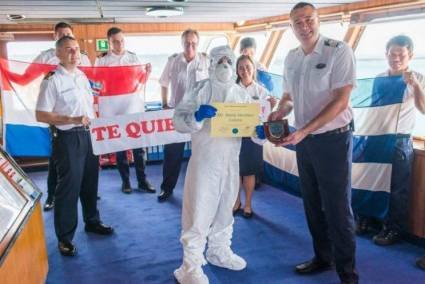
The British cruiser’s command acknowledged the pilot Mario Martínez Lahera and highlighted the effort and organization of the Cuban authorities in this operation. Autor: Taken from Internet Published: 22/03/2020 | 03:31 am
Englishwoman Anthea Guthrie is back home. The imminent danger has passed. But the gratitude and love for the unknown people who helped her and 681 other tourists to return to their country after long days of uncertainty on board the British cruise ship MS Braemar, has been sown in her chest.
Meanwhile, expresses her appreciation, through her social networks, Cuba’s decision to allow the docking of the Fred Olsen cruise ship in the port of Mariel, in the country and all those who participated in the operation are kept under strict epidemiological surveillance.
Isolation
Approximately 198.5 kilometres from Mariel, far from their homes, isolated from their families, but in the care of the medical staff of the Mariscal Antonio José de Sucre hospital in Jagüey Grande, Matanzas province, the three workers of the Unidad Empresarial de Base Prácticos de Occidente, belonging to the Empresa Prácticos de Puertos de la República de Cuba, are well.
They will have to remain there for a minimum of 14 days under epidemiological surveillance, in order to detect in time any symptoms of respiratory disease. These are the perks of the job, and of courage.
The pilot boat driver, Denis Efrén Echevarría Martínez, 35 years old, recalls how the operation was carried out, after its completion, in order to protect their health and avoid possible contagion:
“They moved us to an area where they took off our protective clothing and we quickly got on the bus that brought us here. When we arrived, they explained to us the measures that are put in place in this type of center, where we are monitored for any symptoms related to the disease.
Their phones are ringing off the hook. Family members, colleagues, friends… they are interested in your health, as much as the specialized staff that attends to you.
“I feel fine,” assures the pilot Mario Martínez Lahera, 57 years old, the only one of the Cubans who came aboard the cruise ship, and he adds: “There are good conditions here for staying, for food and medical care, with periodic check-ups of parameters such as blood pressure and temperature, three times a day.
At his side, the skipper of the boat, Alean Torres Pacheco, 21 years old, corroborates this: “They take good care of us. The nurses are, as we say in good Cuban, “up to one”, asking everything about our state of health”.
The mission
Mario Martinez Lahera, who has 31 years of experience and training, did not know the mission in depth from the beginning. He was asked if he was willing, if he felt capable, and he said yes, that he was prepared physically, psychologically and professionally.
“At first they chose another compañero – Luis Alberto Guerra Valdés, with similar experience – and me, and told us that it was a very complex mission. Then they explained to us all the details of the ship and the sick people on board,” says the man who is not only a pilot but also a captain in the merchant navy.
The mission of carrying out the entry and exit maneuvers to the port of the Mariel of MS Braemar was not too different from those he had already carried out during his 28 years of work in the port of Havana. The difficulty was in taking care to avoid contagion.
“I had to stay onboard the ship for approximately 18 hours, although the time was extended to 20 hours because the transfer of the sick had to be done more carefully, both in the port and at the airport,” he recalls.
For Alean Torres Pacheco, the skipper of the Cuban boat that would take the pilot to the ship, the mission took him by surprise: “When they told me that I had been selected, I felt a little strange, and I even got a tremendous lump in my throat. Imagine, I’ve only been working in the port for a year.
“I could barely speak. But understanding that they had confidence in me, I didn’t hesitate to say yes. Of course, they explained to us what security measures we had to comply with, they gave us a vest, nasobucos [face masks), a gown, chlorine to disinfect the surfaces… With all the information in our possession, we went home”.
Denis Efrén Echevarría says that when they told him, he felt a lot of tension and thought about the risks, about his family. Then he relaxed a little. “In our schools, we are educated in the values of solidarity, compañerismo, dedication, and what better time to put them into practice than with this help.
“Of course, I only commented on the mission I was going to fulfill with the family, with my wife… It was all very discreet so that the people of the neighborhood and the colleagues at work would not be alarmed, nor would they feel panic in vain,” he assures us.
The Operation
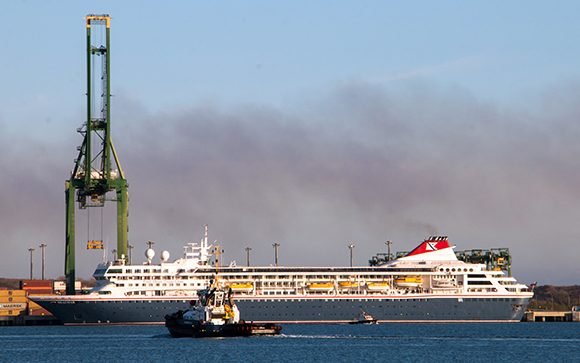
The Cuban decision to allow entry to the cruise did not surprise Cubans, who have a long tradition of medical and humanistic collaboration. Everything went like clockwork. Photo: Abel Padrón Padilla/Cubadebate
It was around four o’clock in the morning on March 18 when they arrived to take them to the port of Mariel. It had been a short night, one of great expectations, but the three of them were ready. Very fresh in Alean’s memory are the details of that early morning’s preparations:
“In a small room at the port, the specialists explained to us how to use the suit and the rest of the clothing we would wear. They dressed us. We could not touch our hands, our eyes, or break the suits they put on us.
“When the time came to board the boat to take the pilot to where the maneuver was going to be performed, we were doing everything very calmly, with a positive mindset, until we got to the cruise ship. After the pilot got on board, we left to wait for him to call us to come and get him”.
Denis’s responsibility as an engine driver was no less important. He had to ensure that the boat’s engines worked properly, that water did not enter the boat, that the temperature and vibrations were maintained, and that there was no noise so that the skipper could concentrate. The relationship between the three compañeros during the mission, Denis summarizes as follows:
“Practitioner, master and engineer are essential: we all depend on each other, and the success of one is the success of the other. We are the guarantors of the safety of the boat on the route between the intersection of the boat at sea, until the pilot performs the docking maneuver in the assigned dock. This is what happened with the British cruiser.
“We communicated with the pilot using the portable radio, once he was already on the cruise ship. He was explaining to us how things were done. On our boat, we had everything we needed on board (food, means for hygiene…), as we did not know how long the operation would take. At all times I thought a lot about the care I had to take, about my two-year-old daughter. I will not deny it: I felt a little nervous, with tension; but seeing so many grateful people saying goodbye to us, made me feel more at ease.
As they sailed to MS Braemar, each one was immersed in his own feelings and thoughts, and attentive to every detail. Mario Martinez, the most experienced of the three, showed no signs of worry, his face remained unaltered. At least, that was what Alean felt during the journey:
“We knew that the pilot was sure of what he was going to do, you could see it in his face. That gave us confidence, because one thinks of many things when one is carrying out a mission like this: I better not even count mine,” he admits.
Certainly, Mayito, as his compañeros say to the pilot, felt calm. In fact, he believes that life had prepared him for that moment and “I was confident because of all the security measures that had been taken by the Government, and because the doctors at the Mariel port took great care to put on my suit, to teach me how to change it inside the ship – because I was wearing four other suits of the highest level -, they emphasized all the measures that I had to take already on board. For all that, I was sure that my life would be guaranteed.
The confirmation that he had been chosen for the mission was given only the day before. For him, it was enough. After the crossing with Denis and Alean, around 6:00 in the morning, Mayito arrived at the side of the cruise ship, ascended the elevator to the deck, where the captain of the ship was already waiting for him, to welcome him on board, according to the navigation protocols, but without extending his hand, the first sign of the protection that the pilot would also receive from the management of the shipping company.
“After the greeting, the first thing the captain did was to thank Cuba for the gesture and then he said something like: ‘Go ahead, the ship is yours. Then we started the maneuvers, taking into account all the technical details for the safe docking of the ship at the port”, says Mayito. Besides guiding the cruise ship, Mayito served as the liaison between the captain and the Cuban port authorities for all the operations that took place onboard the ship, including the disembarkation of the passengers and their transfer to the airport.
During the 20 hours he remained on the ship, where the passengers who did not have any symptoms of illness were normally associated with each other. The pilot witnessed the hygienic measures being taken to prevent the spread of COVID-19. “Every half hour, a crew member spent time disinfecting all handrails and surfaces. I think the shipping company also took every precaution so that I wouldn’t catch it,” he says.
The Family
Alean is an only child, living with his mother and grandparents. Only to them did he talk about the mission. He remembers how, at first, he did not know how to tell them: “When I told them, there was a moment of silence, I saw them uncomfortable, but then they gave me a lot of support.”
On the other hand, Denis is already a family man and he says that in this mission his wife was a very strong supporter from the beginning. Although a little restless, he gave her his support instantly and told her that “everything would be fine, that I would comply with the measures that had been explained to me. Now she talks to our little girl and tells her why daddy is not here.
Mayito, for his part, did not say anything to his family in order to not alarm them, until it was inevitable to tell them. He remembers that “his first reaction was one of fright, but I told them that I was willing and determined, and they had to trust that my decision was the right one”.
Solidarity versus risk
Given the logical fear that each of these three Cubans may have felt because of the danger of a disease that today takes thousands of lives every day all over the planet, and the very risk they could face if something did not go as planned, the images of gratitude of the passengers of the ship MS Braemar who traveled around the world -and their own state of health- are the best reward.
“This operation was a very good thing, even in the midst of the risk it meant, because, hearing how people applauded, shouted from the cruise ship greetings and phrases of thanks to Cuba, gave us encouragement and strength to carry it out.
Even though many outside our country have criticized it, everything we did was good, because we showed, once again, on what side our duty lies, the solidarity we learned from Fidel. Saving lives should be a gesture that always accompanies Cubans,” Alean said.
Something similar happened to Denis, who felt encouraged by the responsibility he was assigned, because “in the face of an operation like this you have to get away from fear and use all your strength because you can’t look bad.
But without a doubt, the one who was exposed to the greatest risk was Mayito. He felt so protected that, when asked, all that stands out is the satisfaction: “I witnessed a lot of joy, happiness, gratitude.”
“My skin stood up when I saw them without knowing how to thank, through me, the Cuban government, for what we were doing for them. The poster and the flag you see on the deck of the ship were part of a tribute to me in recognition of Cuba’s great help. But, of course, there were no hugs.
Three messages to Cuba
For these three Cuban “superheroes” who faced the danger in order to save more than a thousand lives -among passengers and crew members-, the priority is to prevent contagion among the Cuban population. That is why, even in the midst of their rest, they sent three messages to all of Cuba:
MESSAGE 1: “To the population and the families I recommend great prudence, serenity, trust…; that they leave their homes only what is necessary, that they avoid crowds, that hand washing be a practice for now and forever, because it prevents other diseases. In the event of any symptom, they go quickly to their family doctor, so that nobody lets their guard down. Many people think that this is just another disease, just another cold, but it is not. The numbers of infected countries, the deaths… everything is alarming” (Denis Efrén, engineer).
MESSAGE 2: “I recommend that you comply with the measures that have been established, that you trust the indications and decisions that the country’s leadership has taken, that you participate in the active investigation that is currently being carried out, that you isolate yourself when you feel suspicious and go to the doctor, that you think about your family, about the people who may be infected”. (Alean, boss)
MESSAGE 3: “Please take all possible measures and even those that seem to be too much. I’ll give you my own example inside the cruise: sometimes I felt immobilized because my nose was itching or I wanted to scratch my eye, but I knew I shouldn’t touch them. I was in a very risky situation and I assumed that I had to protect myself, that no one had to look after my health but me, and that any action I took was little. (Mario, practical)
PRINT EDITION:
http://www.juventudrebelde.cu/printed/2020/03/22/iespeciales.pdf
Subscribe to Blog via Email
| M | T | W | T | F | S | S |
|---|---|---|---|---|---|---|
| 1 | ||||||
| 2 | 3 | 4 | 5 | 6 | 7 | 8 |
| 9 | 10 | 11 | 12 | 13 | 14 | 15 |
| 16 | 17 | 18 | 19 | 20 | 21 | 22 |
| 23 | 24 | 25 | 26 | 27 | 28 | 29 |
| 30 | 31 | |||||

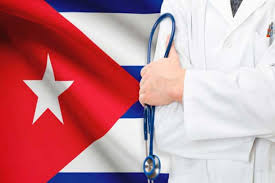



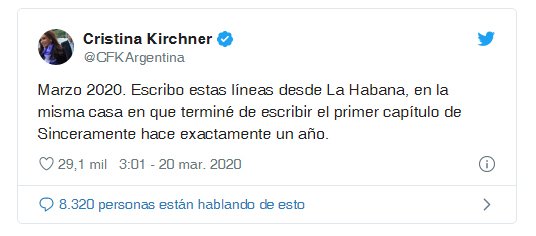
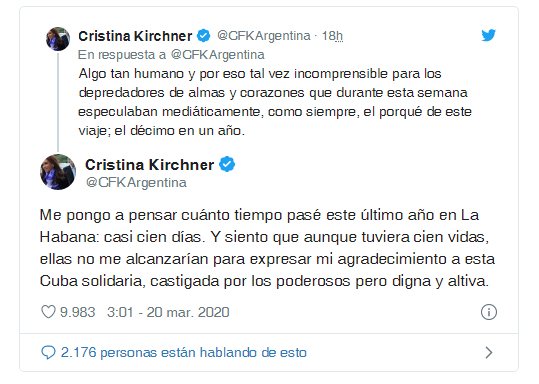
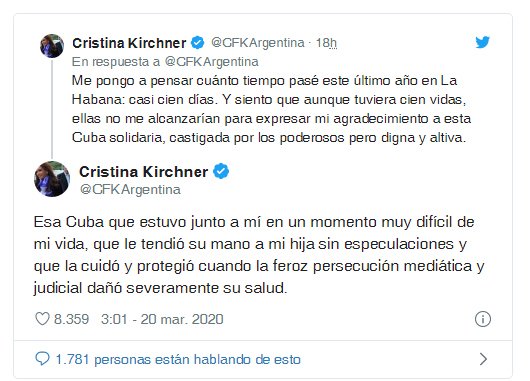
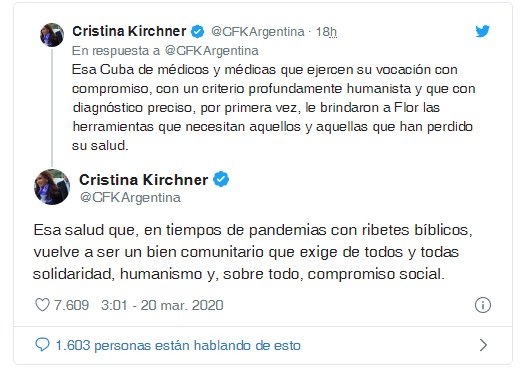
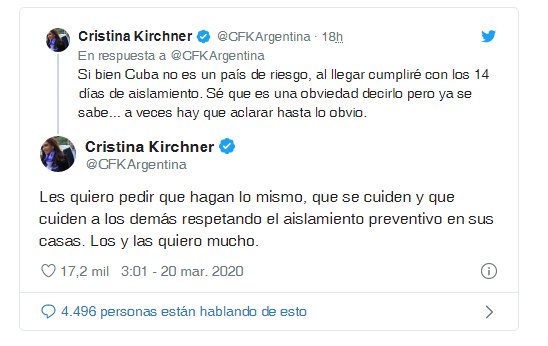
You must be logged in to post a comment.